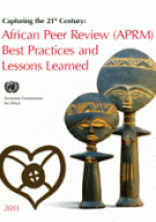Capturing the 21st Century: African Peer Review Mechanism (APRM): Best Practices and Lessons Learned

What is the African Peer Review Mechanism (APRM)? Why was it created? What are its historical antecedents? What are its implementation achievements, challenges and opportunities? Where will it take Africa, if faithfully implemented? These were the overarching questions that prompted the holding of the workshop on “APRM Best Practices and Lessons Learned” by the APRM Support Section, Governance and Public Administration Division (GPAD), of the United Nations Economic Commission for Africa (ECA). As a strategic partner in the implementation of this innovative and bold continental governance initiative, ECA has been at the forefront of both the conceptualization and implementation of the APRM. Almost ten-years into its implementation, it was timely to hold such a strategic event.
The Ad Hoc Expert Group Meeting (AEGM) brought together eminent African scholars and academics involved in governance, development and democratization issues in Africa; practitioners and consultants in the various aspects of the operation of NEPAD and the APRM, as well as those who had been closely involved in the initial stages of the crafting, structuring and implementation of the APRM. The purpose of the meeting was to discuss the background Concept Paper commissioned by the APRM Support Section of ECA, while the specific objectives included: to promote a better understanding of the significance of the APRM process in the trajectory of African political and development thinking; and to examine the implications and impact of the review processes on the various stakeholders, and the experiences gained so far of Africa’s governance systems and development in general.